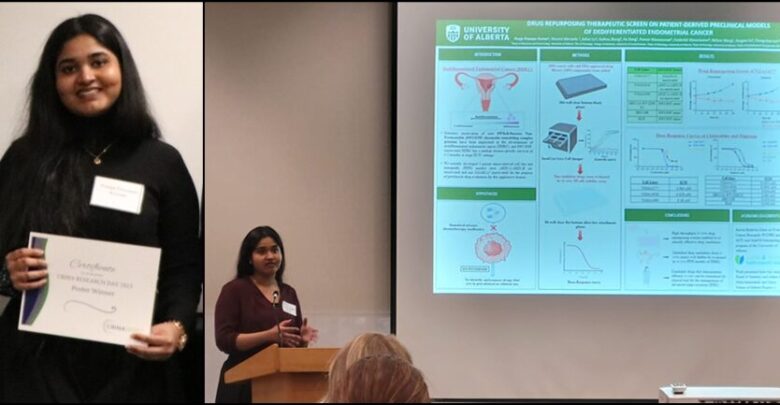 Supplied
SuppliedResearchers at the University of Alberta have found that digoxin, a drug commonly used for heart failure, may effectively treat dedifferentiated endometrial carcinoma (DDEC) — a rare and aggressive form of uterine and endometrial cancer. Dr. Cheng-Han Lee, senior author of the study, said this discovery offers new hope for patients facing limited treatment options.
Dr. Lee is an associate professor in the department of laboratory medicine and pathology at the U of A and the Sawin-Baldwin Chair in Ovarian Cancer. He explained that DDEC accounts for one to two per cent of uterine and endometrial cancer cases, but has a severe impact on those diagnosed.
“DDEC resists standard therapies, leaving patients with a grim prognosis — a median survival of three to four months,” Dr. Lee said. Within this time frame half of the women diagnosed with DDEC will succumb to the disease.
“This treatment is significantly more affordable than new cancer drugs,” Dr. Lee says
Dr. Lee and PhD student Pooja Praveen Kumar led the research team in creating 3D lab cell models from DDEC patient tissue samples to mimic tumour growth. The team identified digoxin as highly effective against DDEC cells in laboratory models.
Following this, they tested various digoxin doses on DDEC and non-DDEC endometrial cancer cells in laboratory dishes. “DDEC cells showed higher sensitivity to digoxin, requiring lower doses for efficacy,” Dr. Lee said.
“When tested on mice with DDEC tumours, digoxin significantly slowed tumour growth at doses similar to those used in human heart patients,” he added. These findings strongly suggest digoxin’s efficacy against DDEC, Dr. Lee said.
”This research could lead to clinical trials,” Dr. Lee says
Building on these results, Dr. Lee’s team is launching a two-year project funded by the Cancer Research Society (CRS) to understand how digoxin targets aggressive DDEC cells.
“This research could lead to clinical trials, helping doctors optimize digoxin’s use in treating DDEC. Additionally, we plan to investigate whether combining digoxin with other drugs might enhance its therapeutic effectiveness,” Dr. Lee said.
Dr. Lee said these discoveries hold immense potential for DDEC patients, who often “never leave the hospital.” Furthermore, repurposing digoxin is cost-effective.
“At $10 per day, this treatment is significantly more affordable than new cancer drugs and immunotherapies. Which can range from $10,000 to $30,000 monthly — the equivalent of purchasing a new car,” Dr. Lee explained.
Kumar, who is leading the next study phase, found current first-line DDEC treatments ineffective. “If clinical trials confirm digoxin’s efficacy — especially in combination with doxorubicin — it could replace the existing chemotherapy regimens,” Dr. Lee said.
Digoxin could be used to treat other cancers with similar genetic characteristics, according to Dr. Lee
Dr. Lee’s study suggests digoxin may also be effective against other cancers with the genetic characteristic of SWI/SNF inactivation. The proper functioning of SWI/SNF is necessary for preventing tumour formation. “This finding opens up the possibility that digoxin could be effective against other cancers that share this characteristic,” Dr. Lee said.
Moreover, while digoxin’s mechanism of action against cancer cells remains unclear, the researchers suspect it may work through the sodium-potassium pump. The sodium-potassium pump is important because it plays a key role in cell adhesion. Abnormal expression and activity of the sodium-potassium pump has been implicated in the development and progression of different cancers.
Dr. Lee explained that “cancer types more sensitive to the drug express a different sodium-potassium pump on their membrane compared to resistant cancer cells. If these suspicions are confirmed, digoxin could be repurposed as a treatment for other conditions with a similar mutated expression of the sodium-potassium pump.”
Dr. Lee is hopeful that advancements will lead to innovative cancer treatments like those offered by digoxin. “Our findings on digoxin could revolutionize the treatment of this rare and aggressive cancer,” he stated.
“Moreover, this research underscores the promise of screening and repurposing existing drugs, encouraging the discovery of more effective and accessible cancer treatments overall.”




